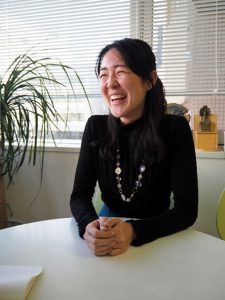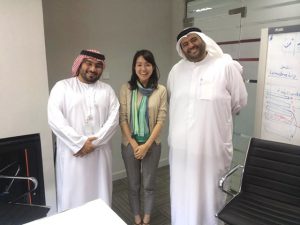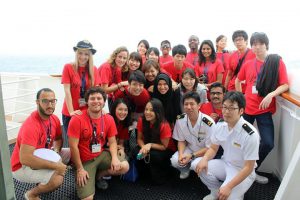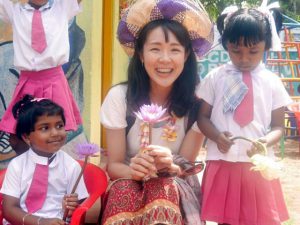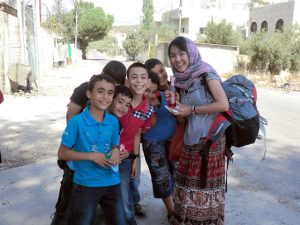[Original by Kiyomi KAMIYA & Harune TANAKA, 2016 Public Relations Intern (March 23, 2017); Translated by N. Mizutani/A. Senkoff]
Hello. This article is written by Harune Tanaka and Kiyomi Kamiya, the 2016 Public Relations interns. We are about to finish our internship and would like to continue the staff interview which 2015 Public Relations interns started last year. We have interviewed Ms. Yamamura, who joined JVC in 2016, and Mr. Imai, who has been transferred from the local office in Sudan to the JVC Tokyo Office. We hope the interviews offer you an opportunity to get to know the JVC staff members.
Ms. Yamamura has been working in Palestine since February 2017. This interview was conducted just before she left Japan. Ms. Yamamura has a charming smile. Before she became a JVC staff member, she worked for a company and a government-related organization. We would like to ask about details of her various experiences.
How did you become interested in International Cooperation?
My father taught at a university, and many foreign students visited our home. Since my parents used to live in the US, many of their American friends visited us, and therefore I was used to having guests from foreign countries. Maybe because of that, I started thinking about working in an international environment full of people with diverse racial backgrounds.
The 9.11. attack which happened when I was in the second year of senior high school, was a big turning point for me. Until then, I had a blind adoration toward the USA (except food) and I thought making a country like the US should be our final goal. However, after the attack, I had no choice but to change my values and way of thinking. Having found out that I was living in an unstable world, I started to look for my own “answer” and think about developing countries rather than developed countries. At university, I majored in development economics. I am ashamed to say it was then that I had first learned about the reality of the world.
You worked for a company and a government-related organization before you became a JVC staff member. Right?
After studying development economics at university, I studied at a graduate school in the UK. My major was conflicts and development mainly in Africa. I met many students from former colonies of Great Britain, such as Kenya, India and Pakistan. They kept asking me “Why are you, a student from a wealthy country, majoring this field?” Day after day, I wondered what I, a Japanese, could do, because Japan tends to be a third party when it comes to international aid.
After graduation, I came back to Japan and worked for a company, while volunteering at an NGO which specializes in emergency-relief work. In my company, after working for three years, we all had to undergo training called the “fourth-year training.” The aim of this training was to make a clear career plan for ourselves, write a thesis about our goals for working in that company, and to make a presentation. Unfortunately, I did not have a clear image of myself working in that company in the near future, and I did not really have a future goal. It was then that I decided to quit my job and start my career in international cooperation.
I worked as an intern for several months at an NGO which specialized in supporting women and children in developing countries. I learned about public relations and also how hard it is to raise fund for these activities.
What did you do after you finished your internship?
Although I was firmly determined that I wanted to work in the field in international cooperation, I was not confident enough to work at an NGO. Having worked as an intern at an NGO, I had experienced the severity of fundraising. This made me think working for an NGO might not be a sustainable way of working. So I wanted to experience other forms of international cooperation, and decided to work for an extra-government organization of the Ministry of Foreign Affairs. At this organization, I worked on introducing the Japanese education system and language classes to Abu Dhabi, United Arab Emirates (UAE) as well as increasing the number of students who study in Japan. Meanwhile, we conducted human resource development programs. By introducing Japan’s education system, we attempted to construct a real relationship, which went beyond the petroleum business.
After that, I found employment at an extra-government organization of the Ministry of Economy, Trade and Industry. I coordinated international conferences between Japan and Abu Dhabi, while supporting Japanese companies which wanted to expand business to Abu Dhabi.
Do you have any interesting episodes?
Arabian society is a “verbal” community, and therefore, it is critically important to say things directly to your negotiating partner. When I tried to make an appointment on the phone from Tokyo, they would just say, “Just come here and then we can have a talk.” They do not make any decisions unless I actually go there. So I always left Tokyo with few appointments. And believe it or not, once I arrived, they would welcome me right away, and I was busy completing my job. Also, I learned that they would not negotiate without a staff member working at the local office, so it was necessary to have a representative stationed.
How did you get your position at JVC?
Although I had chances to visit UAE once or twice a year, I wanted to work at a closer place. I felt that there are things which can only be achieved through a long-term relationship. However, I knew that I wouldn’t have many chances to be stationed in UAE because I am a female. Then someone recommended me to participate in the Ship for World Youth Leaders Program, which is a project conducted by the Cabinet Office. I was still eligible for the age requirement and decided to participate.
One hundred and twenty Japanese youth and 120 youth from Five Continents lived together on the ship and on the land for about a month and a half. People with diverse backgrounds, such as Muslims, Africans, South Americans, studied about leadership, management and cross-cultural understanding. We got together and hosted a workshop in which participants experience the process of conflict. We repeatedly revised our plan. I was very happy to know that the participants gained greater awareness than I had initially expected.
I had an opportunity to discuss the Palestine problem with Arabs living in New Zealand and some Mexican-Jewish people. Moreover, I enjoyed discussing the issue by including the views of the Sri Lankan people and believed it was possible to change the world by working with people from all over the world. Living on the ship, we became like family members and I realized that the world is smaller than I thought. I learned that the whole world is my field and, wherever I go, I can have a happy life, because we all belong to the same human race. After the Program, I heard that JVC, where I was a volunteer member, was recruiting local staff.
You have certainly had various experiences, isn’t that so?
I am not good at dealing with several things at the same time. I am the type of person who bumps into something and then suddenly decides what to do. If you want to get involved in the Palestine problem, the easiest way is to study the Arabian language at university. But in my case, I tried a lot of things and finally arrived here, and now I am trying to put all my experiences together!
Were you interested in Palestine in the first place?
I studied about conflicts at graduate school, but had never been to a conflict region. I was studying about conflicts in Africa. It was not directly related to Palestine, but a friend of mine, who was working as an intern of the Palestine project, asked me if I was interested in participating in a tour to Palestine. That was my first time to visit Palestine. Just then, I finally decided to quit the company for which I had been working since I graduated from university. I was going to start my new career for international cooperation. It was perfect timing.
After actually being there, my image toward Palestine totally changed… The street is safe. People are generous. People’s image toward Japan was so nice. That was completely different from the image I had before. I knew intuitively that I could live there. In addition, I could make good use of what I had studied, and above all, I liked the mood and character of the local people. It fit me. I was attracted to the Bedouin culture, the way they greeted travelers. And their nature… the way they don’t take things too seriously and make jokes. Their reality was living in a world of irrational occupation. I couldn’t help asking myself what had these people done to deserve this? I started to think strongly that I wanted to get involved in Palestine and support them, although I wasn’t really sure how much I could offer.
When I was at graduate school, I was not sure how a Japanese like me, who is an outsider, could commit myself to the world. However, I finally found something I could do.
After experiencing so much, you are finally heading for Palestine. What do you want to do there?
First of all, I would like to continue the current projects. In addition, from my experience of working with Arabs before, I believe it is very important to have some private communication with the local people. A JVC staff member from Afghanistan, who visited Japan the other day, told me that Japanese people tend to focus on business, but they want us to have more casual communication, and that helps business as well. In Palestine, I would like to cherish my experience. I want to create good communication links with local people not only for business but also as good friends.
I want to work not only with Palestinians but also with Israelis and people from other countries, because it is critical to inform people of the situation of the Palestinians and support them strategically.
[After the interview…]
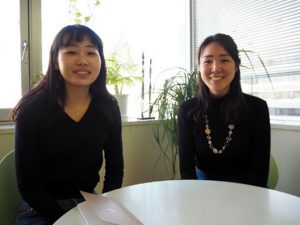
Tanaka (left, one of the writers of this article) and Ms. Yamamura. We are looking forward to hearing about life in Palestine!
Ms. Yamamura, a constant challenger, is so cool. We were overwhelmed by her sincerity. In addition to studying development economics at university, and conflicts in Africa at graduate school, she has lived in the Middle East and even on a ship. She has a huge amount of information and is like a living jigsaw puzzle, with all the pieces fit in. All the episodes were interesting and we were greatly impressed by her kindness and thoughtfulness towards the local people.
* The order of uploading the English version of “Staff Interview” is random and hence different from the order of the original Japanese version. We are sorry, but the person coming next may be different from the “next person to be interviewed” mentioned in the text.
Share This:
